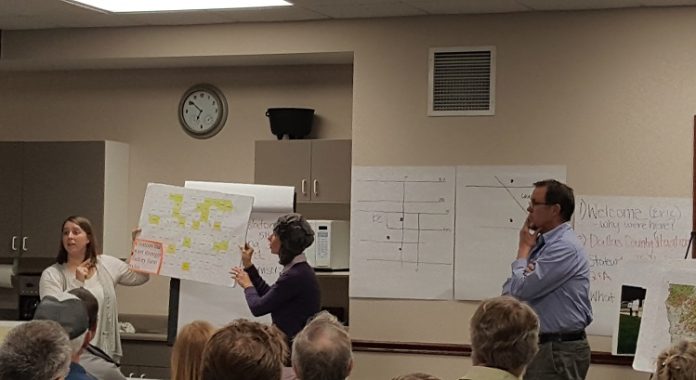
The strong odor of hog manure greeted the 60 people arriving Monday night for a meeting at the Raccoon Valley Bank in Dallas Center. The stench seemed fitting because the meeting, called by the Dallas County Farmers and Neighbors (DCFN) and the Iowa Citizens for Community Improvement (ICCI), focused on the five new concentrated animal feeding operations (CAFOs) now under construction in Dallas County.
The freshly dunged fields around the bank were probably fertilized from the CAFO cesspits of Robert Manning, described as “the county’s most notorious confiner” by Stacy Hartmann of rural Minburn, one of the meeting’s DCFN organizers. Manning is in the process of nearly doubling the number of hogs in his Dallas County CAFOs, with three new confinements rising near Dallas Center, one near Granger and one in Lincoln Township west of the Washington Township School.
Manning’s CAFOs will feed hogs owned by the integrator Iowa Select, the state’s largest hog corporation, which is angling to build 19 new swine confinements statewide. The CAFOs combined will add about 90,000 more hogs to the state’s annual production, along with about 36.7 million gallons of manure.
“That’s enough manure to fill 55 Olympic-size swimming pools every year,” said Jess Mazour of ICCI. “This fight is heating up. Just last week Franklin County recommended the DNR deny one of the 19 Iowa Select factory farms, and Humboldt County is set to do the same, and Iowa Select had a manure spill this weekend. These factory farms are bad news for Iowa.”
Sam Dings told the crowd he knows just had bad the news is. Dings bought the house at 28210 240th St. at the beginning of July and now finds himself the nearest neighbor to Kent Pork LLC, a new Manning CAFO on S Avenue one mile east of Dallas Center.
“We just moved in two months ago,” Dings said. “Then all of a sudden we have all these cement trucks driving by. There were more than a hundred of them. I didn’t know what they were doing.”
Cement is used to line the manure cesspit underneath the confinement building.
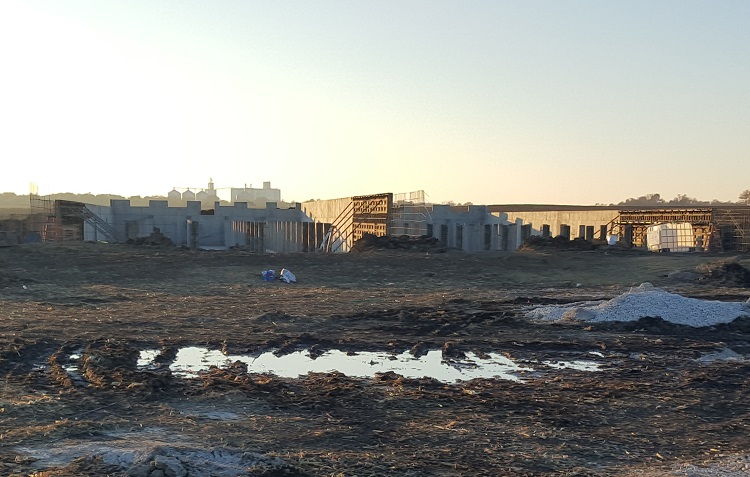
Another Manning CAFO lies one mile south of Dallas Center on 260th Street, with the Brenton Arboretum lying 1.5 miles west. Each of the new Manning CAFOs will house 2,490 hogs, just 10 head below the number of hogs that would trigger the regulatory need for both a master matrix score and a review by county boards of supervisors, with the likelihood of a public meeting.
Iowa Department of Natural Resources (DNR) regulations vary according to the size of a CAFO. All structures need construction permits, but a confinement housing 1,249 hogs or fewer does not require a DNR-approved manure management plan. CAFOs with 2,499 hogs or fewer do need a manure plan but not a master matrix score.
Mark Gritman of rural Dawson pointed out that the 1,600 people of Dallas Center will be surrounded by 7,500 hogs. One hundred percent of the human waste produced by the people of Dallas Center is treated in the city’s wastewater treatment plant, but 0 percent of the hog waste is treated. It is instead removed from the cesspits and spread directly, untreated, onto crop ground.
“If we had the waste of 1,600 people in Iowa not being treated, that would be a national crisis, right?” Gritman said. “Why is there the difference?”
Many small towns in Iowa currently face steep costs for upgrading their wastewater treatment systems to meet new DNR discharge standards. None are considering spreading untreated human waste onto farm fields.
Eric Wessels of rural Dallas Center, one of the meeting’s organizers, has lived downwind of a Manning CAFO for several years. Wessels is a Dallas County Soil and Water Conservation District commissioner and a member of DCFN.
“We need to be able to find a way to talk to our legislators,” Wessels said. “We need to be able to find a way to get them to understand that this is a local issue, and local people should be able to decide what’s going on.”
Mazour described the effects of industrial-scale agriculture on rural communities, where the countryside is gradually depopulated, and the small market towns wither away.
“Consolidation is not working for us,” Mazour said. “Right now companies like Iowa Select and Farm Bureau and Monsanto are doing great, but look what’s happening to our state. We’re not doing great. These big ag corporations are getting the profits, and we’re getting the pollution.”
Hartmann discussed the power of agribusiness corporations and the process of legislative capture, which sees the state’s lawmakers neglecting the people of rural Iowa and serving only the corporations.
“The regulation around this industry is extremely flawed,” Hartmann said. “It was designed by the legislature and its industrial-ag sponsors to favor the confiner and the corporation that has the contract with the confiner and ignore the interests, the rights and the wellbeing of residents, whom it leaves powerless.”
A number of public figures attended the meeting, including Sue and Buz Brenton, who voiced concern over water quality at the Brenton Arboretum, which lies about 1.5 miles west of Charlie Pork LLC.
Dallas Center Mayor Michael Kidd and Dallas Center City Council member David Bagby also attended.
The first portion of the meeting was public, and the media was welcome to report. The second portion of the meeting was closed and restricted to people opposed to the Manning CAFOs, which meant some of the hog producers present were respectfully asked to leave the meeting. The exclusion rankled some attendees, who spoke after the meeting.
“My family and I attended,” said Linda Brewer of rural Dallas Center, whose family owns a 3,300-head hog confinement and a 125-head cattle operation. “We were asked to leave because we raise pork.”
“We did not have a chance to say if we were for or against the proposed barns,” said Emily K. Wynn, whose family owns a CAFO north of Dallas Center. “Since we are pig farmers, they assumed we were for them. There are many kinds of farmers and many sizes of farms. Tonight all were classified as one, and that one was not welcomed.”
“They treat us already like we’re criminals,” said Joe Brewer, Linda Brewer’s son. “We just want to make sure people to hear our side of the story.”
“But instead we were kicked out,” Wynn said. “In my life I have never been kicked out or segregated for being in ag or a farmer. I am outraged and disappointed in a community I have grown up in and loved my entire life.”
Once the pro-CAFO contingent withdrew from the meeting, the organizers discussed strategies for opposing further expansion of the factory farm system in Iowa, including calling for a statewide moratorium on new CAFO construction, a call the legislature ignored last session.
They also encouraged attendees to sign a petition calling on Iowa Select owner Jeff Hansen to withdraw all factory-farm applications and meet with community members impacted by Iowa Select’s contract producers.
Speaking on Facebook after the meeting, Kady Godfrey of Dallas Center said she sympathized with the excluded hog producers, but she also pointed out the difference between a family farm and a factory farm.
“I think we all agree,” Godfrey said, “that living in a rural, ag area, livestock farming is an expected part of life, and the farm stinks. That’s nothing new. Six large-scale hog operations in a small area has a major impact on everyone. One family farm or even one commercial operation is different than 7,000-plus hogs moving within a few miles of each other.”
The 40-year-old ICCI has a long track record of failures — the state’s 750 impaired waterways suggest how effective environmental activism has been in Iowa — but also some notable successes. In 2011 ICCI joined the Iowa chapter of the Sierra Club in threatening to sue the U.S. Environmental Protection Agency over its alleged failure to enforce the Clean water Act in Iowa. The result was the Iowa Nutrient Reduction Strategy.
“We won’t back down without a fight,” Mazour said. “Our health, air and water are too important.”
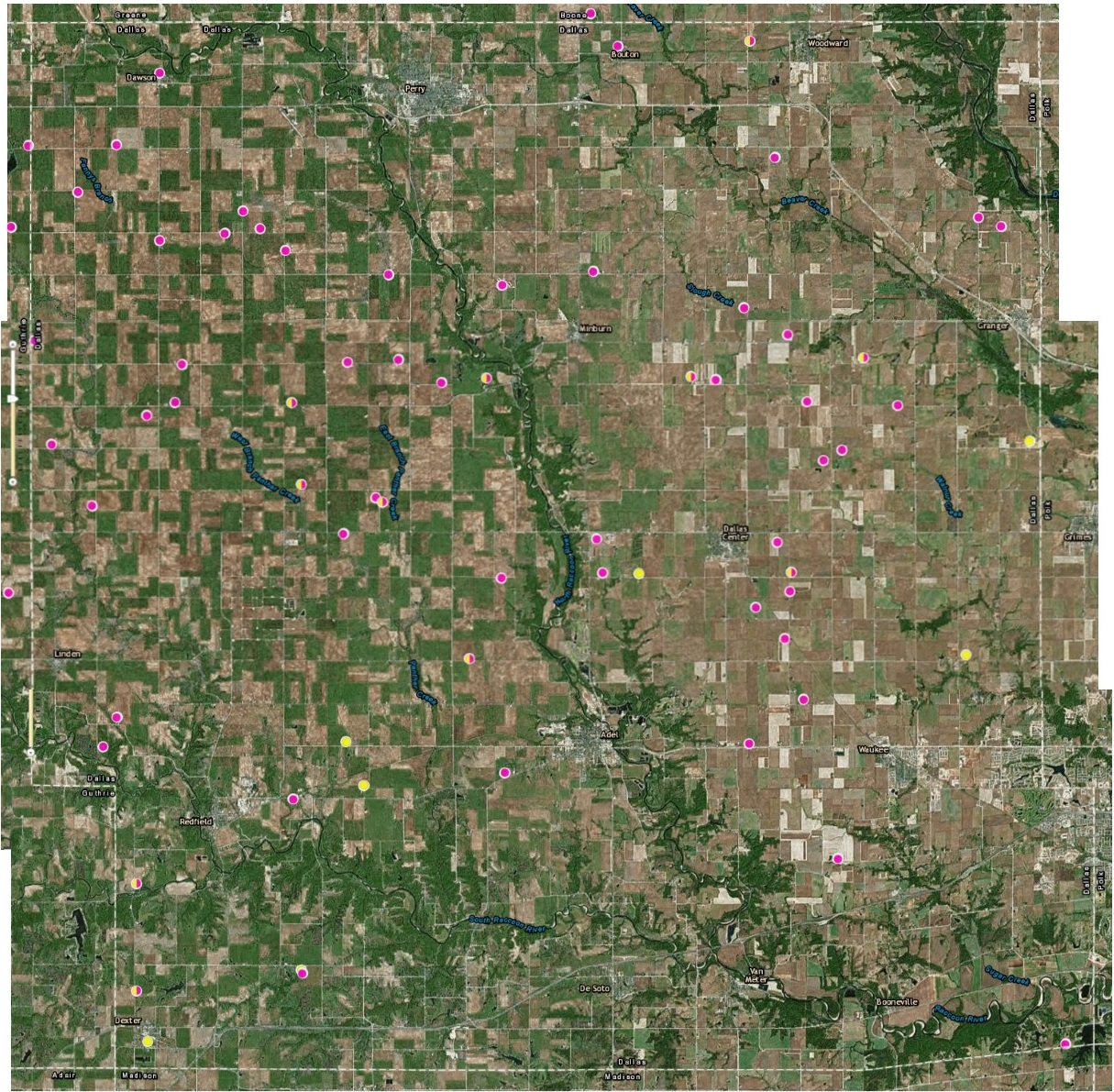






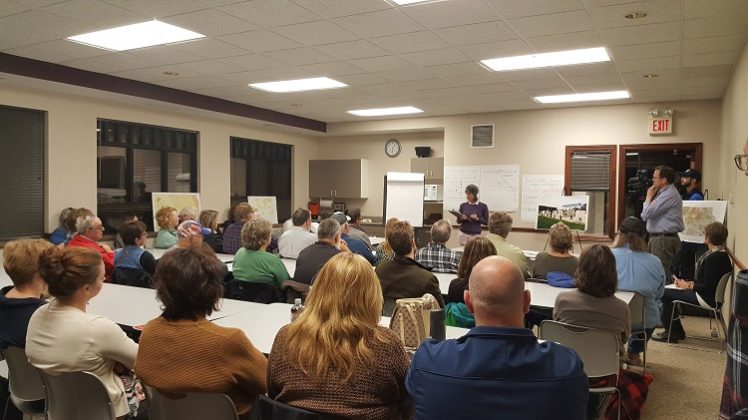
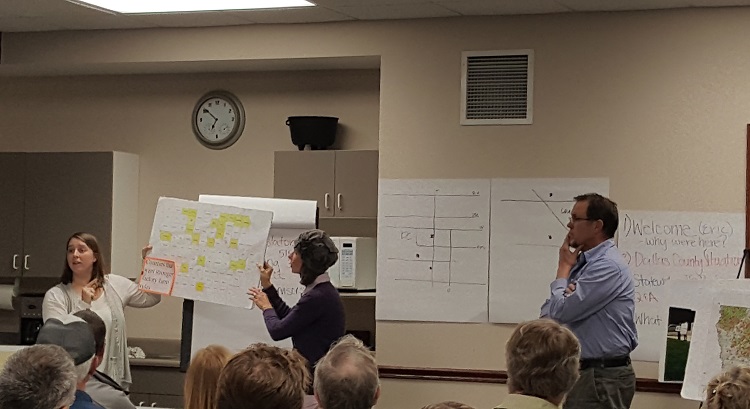
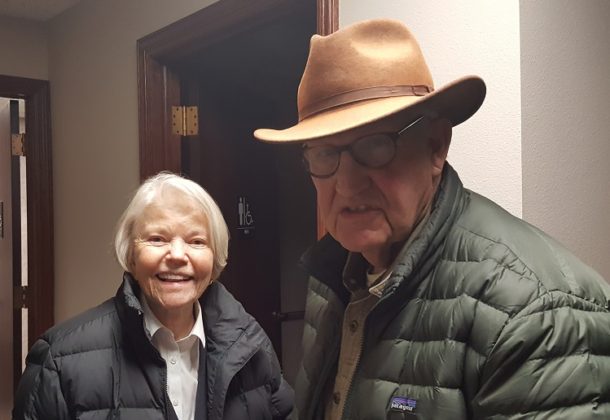
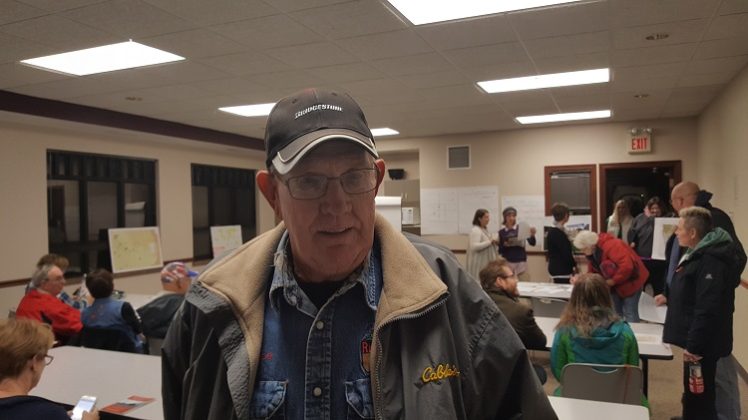
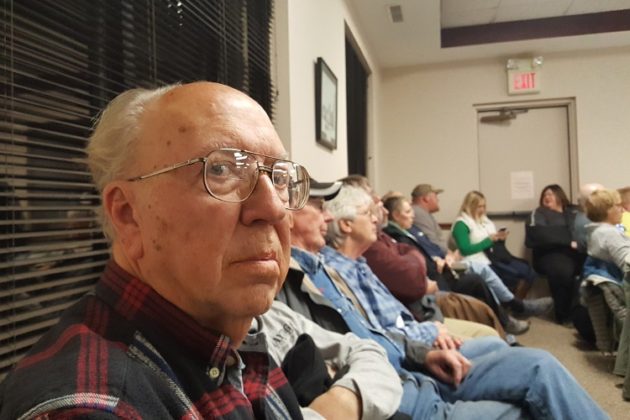
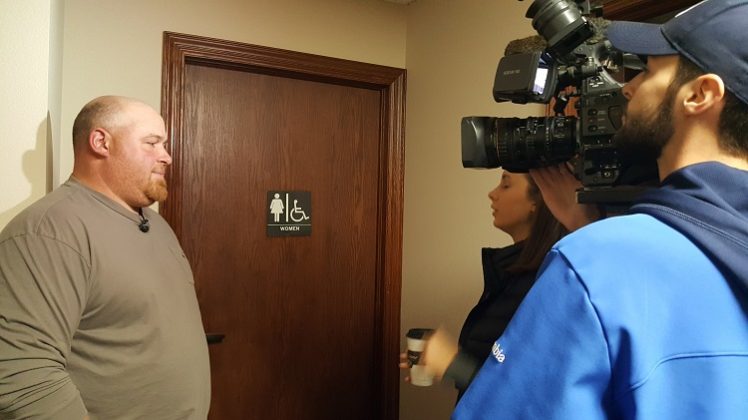
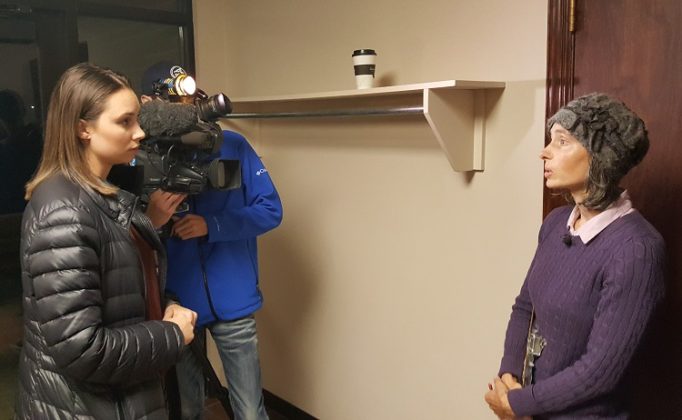
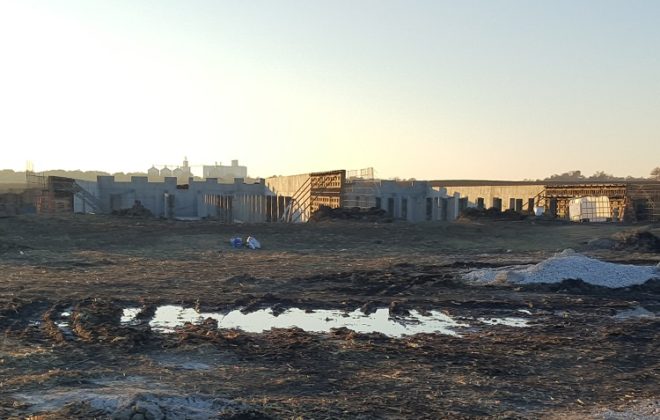
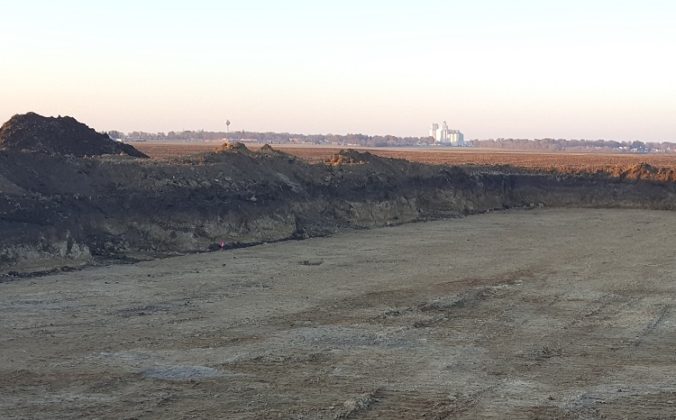
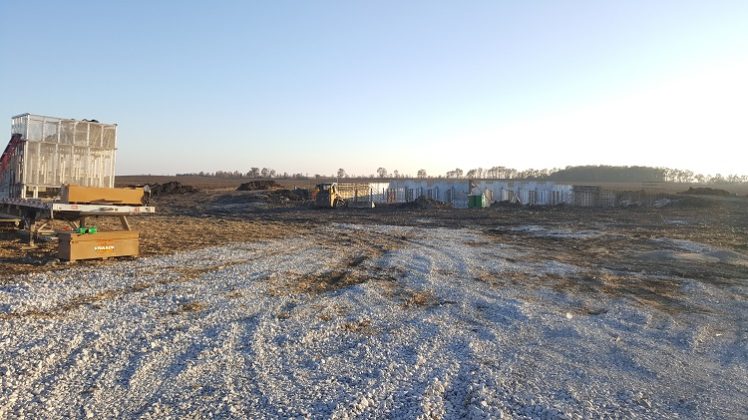
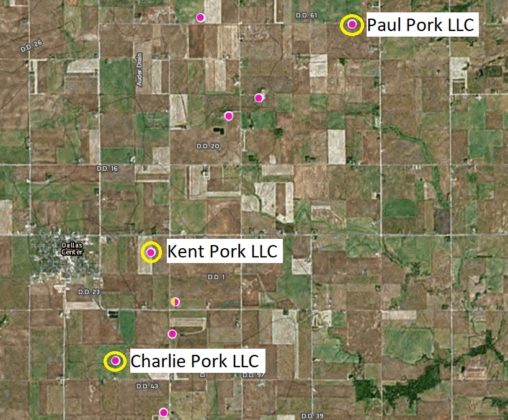











Great coverage of a story that should be of interest to everyone in Dallas County. ThePerryNews.com is the only local news outlet covering this story immediately after it took place.